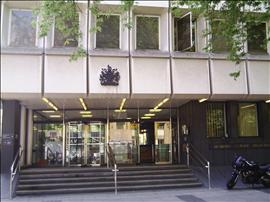People from all walks of life in London are being urged to consider becoming magistrates in a £1 million national recruitment drive to increase the number and diversity of those fulfilling this essential role.
With support from magistrates in London, a new marketing campaign launched by the Ministry of Justice seeks to boost numbers by 4,000, with recruits expected to help tackle the backlog of criminal cases caused by the pandemic. It represents the largest recruitment effort in the 650-year history of the magistracy and could increase the workforce by up to a third in the coming years.
The Ministry of Justice is keen to tackle misconceptions about magistrates and increase interest in the role, in London and beyond. Research shows 26% of people in London are interested in becoming a magistrate but this jumps to 44% when they learn more about what is involved.
There are major knowledge gaps when it comes to the role of a magistrate. Research shows that many in the region do not realise it’s a part-time role that can fit round other commitments, with 36% thinking it is full time. 46% are unsure if they are eligible for the role, with 34% believing it requires a degree in law. In fact most people can become a magistrate – from ambulance drivers, to mechanics, to personal trainers.
The campaign aims to attract people from a wide range of backgrounds – from teachers to bricklayers, to stay-at-home mums, and any individuals who can display reason and sound judgment. It seeks to make the magistracy more representative of the communities it serves and will specifically target younger people – with anyone over 18 encouraged to consider the role.
Currently in London, almost a third of magistrates (31%) are from a Black, Asian or minority ethnic background and the Ministry of Justice is keen to continue to attract, and increase, the numbers of diverse candidates to ensure the magistracy reflects the diversity of the Capital. The MoJ is also looking to attract a younger wave of volunteers, with less than one in ten magistrates (7.2%) in London currently under 39.
Each day magistrates across England and Wales make life-changing decisions in cases as varied as fraud and sexual assault. The work is voluntary with individuals expected to dedicate a minimum of 13 days a year service, meaning many magistrates often fulfil this crucial role easily alongside full-time employment and caring responsibilities.
Today’s announcement comes as the Government last week unveiled plans to double magistrates’ sentencing powers from six months to a year to help drive down waiting times and bring criminals to justice more quickly. The step is expected to free up an estimated 1,700 extra days of Crown Court time annually.
Emily-Jane Morris (24 years old) from Kingston, South West London, has been a magistrate for almost three years. She became a magistrate to support her local community and wanted to get more involved in the legal system. On her role as a magistrate, Emily-Jane says
“I help make decisions that bring justice to those brought before the courts. We focus on understanding people’s motivations and helping rehabilitate them so they are least likely to reoffend. I want to smash the stereotype of what type of person a magistrate is. I don’t have a degree in law, I was given all the training I needed. The main things you need are integrity and self-awareness. It’s so rewarding to know you’re making a difference to people’s lives.”
Deputy Prime Minister, Lord Chancellor and Secretary of State for Justice, Dominic Raab, said:
“Magistrates are a vital pillar of our world-class justice system and we want people from every part of society represented in their ranks.
“If you care about your community and want to give back then I would encourage you to apply to become a magistrate. There are few other opportunities that can make such a difference in people’s lives.
“Alongside our plans to double their sentencing powers from six months to a year, this recruitment drive will ensure magistrates can play an even greater role in restoring the swift justice the public deserve”
All magistrates are given robust training and an experienced mentor in their first year to develop their skills and legal knowledge. The top qualities that MoJ and the Judiciary look for in potential candidates are good communication skills, a sense of fairness and the ability to see an argument from different sides. Candidates are being sought to fill positions across all jurisdictions including criminal work, youth cases, as well as certain civil and family proceedings.
Gilles Casse (67 years old), from New Malden, South West London, has been a magistrate for 13 years. He wanted to bring diversity to the justice system and give back to the community. On his role as magistrate, Gilles says:
“The highlight for me is making a difference to people’s lives. I love dispelling the stereotype of who a magistrate is – you can be from any walk of life. You get all the training you need and you also have the support of other magistrates. You just need to be patient, willing to learn and have an open mind.”
Bev Higgs, National Chair of the Magistrates’ Association said:
“The Magistrates’ Association is pleased to support this recruitment campaign and would encourage people of all ages and backgrounds to contribute their lived experience, knowledge and commitment to the judiciary.
“It is vitally important that Magistrates’ Courts reflect their local communities, and we welcome all who join us in this unique and very rewarding role.”
You can find out more about becoming a magistrate and register your interest to be the first to hear when vacancies open up in your area: www.icanbeamagistrate.co.uk
